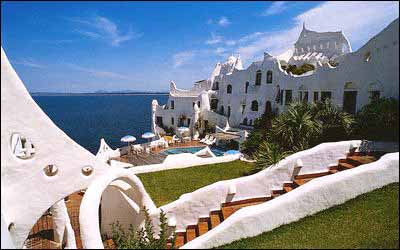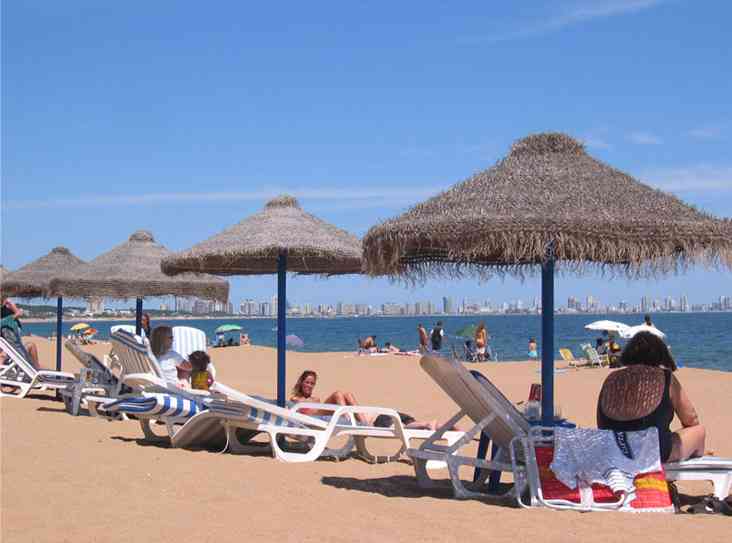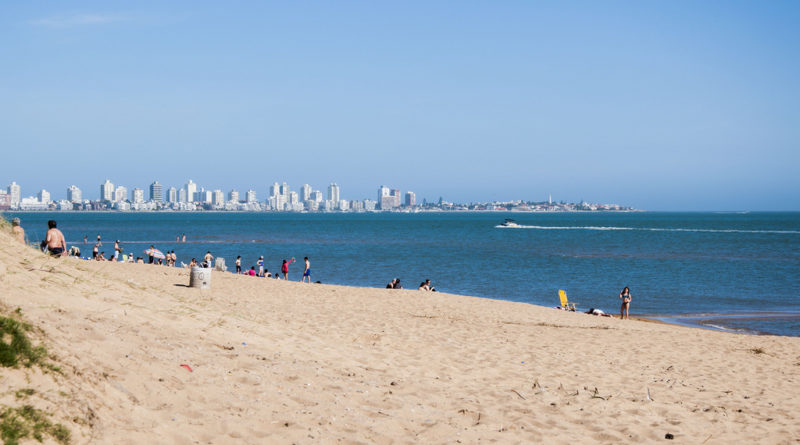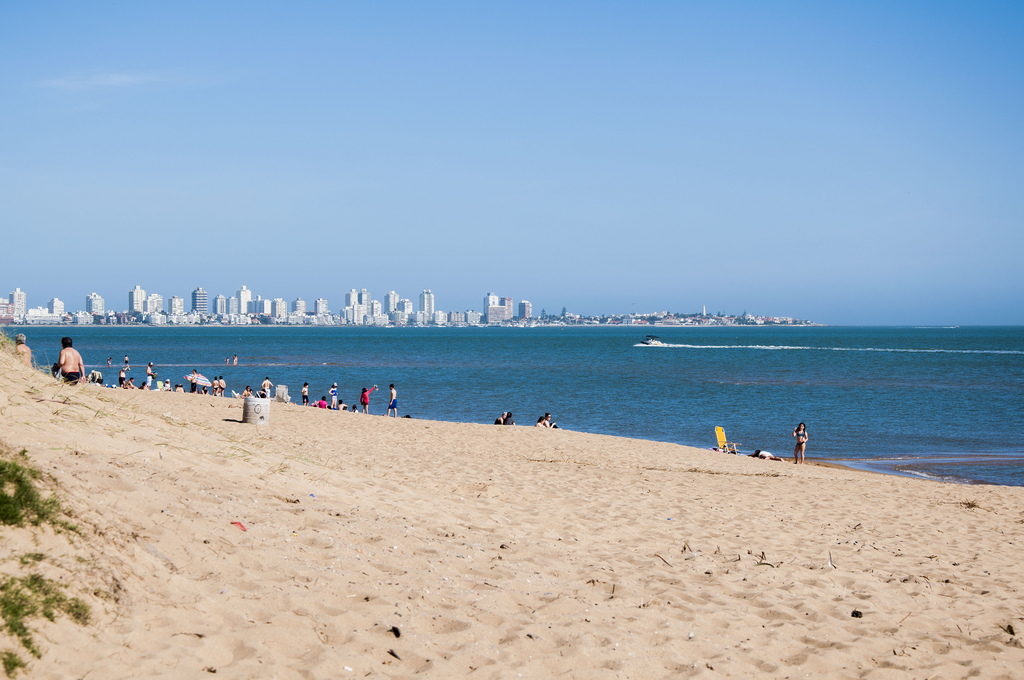New Economic Policy Creating New Opportunities and Awakening Old Conflicts Between Uruguay and Argentina
On September 26 the Uruguayan government revealed five new economic reforms to attract foreign tourists in preparation for the southern hemisphere’s budding summer vacation season.1 Most visitors to the country come from its neighbor Argentina, a group that makes up approximately 78 percent of the total number of tourists that visit annually.2 Recent economic restrictions in Argentina have worsened the already strained relationship between Argentina and Uruguay, as they struggle to facilitate economic growth and retain the relatively scarce level of capital within their own countries.
Political Sympathizers, Economic Foes
Uruguayan President José Mujica and Argentine President Cristina Fernandéz de Kirchner both are leaders of left-leaning political administrations, but bilateral ties between the two countries have created rifts regarding a series of significant economic issues, including those pertaining to tourism. President Mujica has somewhat departed from the protectionist economic ideology of his party in order to spur economic growth in his country.3 Uruguay has recently been focused on economic reforms that will offer incentives for foreign individuals and companies to invest in the country. Since November 2011, in order to protect against capital outflows and inflationary pressure, President Fernandéz de Kirchner has enacted austere foreign currency restrictions that have incensed many Argentines.4
One of Fernandéz de Kirchner’s aims is to deter Argentines from spending hard currency outside of the country. This government stance has come with several very visible monetary restrictions, such as the requirement that credit card purchases made by Argentines travelling outside of the country now stand to incur an additional 15 percent surtax. Measures have also been enacted against the country’s companies, which now must ask for government approval in order to import goods or purchase U.S. dollars. Many countries around the world, including Uruguay, regard these restrictions as “radical Argentine protectionist measures.” However, Argentina feels that these measures are necessary in order “to tackle its dwindling trade surplus and halt dollar flight” from its country, according to comments made in the Buenos Aires Herald.5 President Fernandéz de Kirchner’s strong-handed protectionist approach to tackling the country’s drained economy has become a cause of concern for countries tethered to Argentina through trade and tourism, specifically Uruguay.
Uruguayan Economic Policies
Uruguay’s economic initiatives come as a somewhat reactionary effort to combat Argentina’s stringent economic restrictions, measures that Montevideo worries might seriously deter from a profitable tourist season. Uruguay’s economy relies on trade with Argentina, even more so now that the tourism industry has begun to take off in Uruguay. Many prosperous Argentines have second homes in Uruguay or rent seasonal vacation homes. Just within the first fifteen days of the 2012 summer vacation season, the number of tourists visiting Uruguay reportedly increased by 26 percent in comparison to the previous summer.6
As a way to counteract Argentina’s protectionist strategy, the government in Montevideo has created five specific economic initiatives that it hopes will render the country more attractive to tourists. The first initiative will give foreign, non-permanent residents a value added tax (VAT) rebate of up to 22 percent for purchases made with a foreign credit or debit card. This VAT rebate can be used for car and lodging rentals, as well as food purchases from grocery stores, bars, and restaurants. However, this VAT rebate is seasonal as it is only applicable during the peak tourist months from November 15 to the following March 30.7
The second initiative also includes rebates for non-permanent resident foreigners. Those renting real estate through specific Uruguayan agencies and paying with foreign credit or debit cards will be given a rebate comparable to 10.5 percent of their rental value. This additional rebate is also slated to be in effect from the middle of November 2012 to the end of March 2013.8

Moving beyond the first two initiatives, the third will only affect the border cities of Salto, Paysandú, and Fray Bentos, as they are to be designated as tax-free. Such a status means that foreigners will receive a VAT rebate on most of their purchases.9 A year round tax-free status in these three cities is likely to fundamentally alter their economies given that integral segments of the tourist industry––for example resorts, hotels, restaurants, and home and car rentals––are expected to benefit from increased revenue.
While significantly smaller, the final two initiatives will also be influential. With the fourth initiative, also in effect between November 2012 and next March 2013, vehicles registered outside of Uruguay that enter the country will receive a one-time subsidy worth $25 USD.10 This subsidy is meant to go towards petrol purchases, though it is not a significant incentive for tourists since the rebate is unlikely to cover even half the cost to fill up a tank of gas.11 The final incentive, however, is expected to have a greater effect on attracting tourists. This initiative, which affects Antel, Uruguay’s national telecommunication company, provides tourists visiting the country during the peak season with special offers on dial-up and wireless Internet services, as well as mobile and home phone packages. This last tailored deal includes an important provision for free calling to bordering countries, in addition to family phone plans.12
Some Uruguayan citizens, including supporters of President Mujica, are wary of these policies since they will benefit visiting foreigners who already are the region’s wealthy elite.13 However, the government is hoping that by catering to the needs of these wealthy tourists, ultimately the Uruguayan tourism industry and the country’s citizens employed serving it, will also benefit.
Uruguay’s incentivizing economic measures are estimated to cost the country between $10 million to $12 million USD. Though many Uruguayans are uneasy about spending a substantial sum, let alone appreciable tax dollars on non-citizens, government officials believe it is worth the investment. Tourism currently accounts for 7 percent of Uruguay’s GDP, equivalent to $2.8 billion USD. In addition, the Uruguayan Ministry of Tourism estimates that 150,000 jobs rely on a profitable summer tourism season.14 For Uruguayans employed in these jobs, spending government funds in order to ensure a successful tourist season will seem well worth the cost.
Beyond Tourism: The Future of Collaboration in Latin America
Argentina could take a lesson from Uruguay’s more pragmatic approach to dealing with a weak economy. Montevideo has honed in on specific areas of the economy that have obvious profitable growth potential, like tourism, and have invested heavily in those tourist related sectors in order to raise revenue as much as possible. Applying a degree of foresight, Uruguay has pinpointed specific ways to attract tourists. Yet, it is important to mention that Montevideo is not relying solely on the Argentine market for visitors. In addition, to fill its beds, the country has also specifically marketed to Paraguayans and Brazilians.15 For all of the potential benefits of Montevideo’s system, Uruguay still runs the risk of attracting tourists through excessive incentivizing, which could lead to a ‘race to the bottom’ style of competition in which Uruguay ultimately is not likely to benefit.
Argentina has created a very restrictive and alienating economic platform that will penalize its citizens for spending money outside of the country. Considering the new requirements on imports and exchanges on U.S. currency, some critics will say that these measures may give the government too much control over private business decisions of Argentine companies. These policies could also allow Argentine authorities too greatly influence many private aspects of its citizens’ lives, including where they spend money and where they vacation. As it stands, the Argentine government seems to be prescribing to a brand of extreme state interventionism, in which a democratic society can or should be able to force its citizens and corporations to only spend money only within Argentina. These policies of extreme economic control, reminiscent of the failed 1970s import substitution industrialization policies, could also be seen a blanket reaction aimed designed to cover up economic problems such as capital flight, growing inflation, and external debt. In the end, these policies have negated the possibility to apply a less restrictive solution in addressing the need for sustained economic growth.16

As many countries in Latin America work to rebuild and strengthen their economies from the lingering global economic crisis of 2008, they continue to enact beggar-thy-neighbor reforms that only singularly benefit the domestic economy while damaging intraregional trade. Meanwhile, there has been an effort to mutually integrate and jointly develop amongst Latin American countries. In Central America, for example, the Central American Integration System (SICA) aims to establish a free trade zone, central market, and eventual political unity.17 Moreover, the southern cone body, Mercosur, has slowly worked to develop an economic and political agreement amongst Argentina, Brazil, Venezuela, Paraguay (though presently suspended), and Uruguay, in order to facilitate free trade between member states.18 However, there is a vivid disconnect between the current trend encouraging beggar–thy-neighbor policies, and the holistic process of encouraging stronger and mutually beneficial trade organizations. Despite Mercosur’s intentions, there has been little indication of a move towards greater regional integration, or the development of a regional common market.19 The Mercosur countries need to address the issue of nationalist inspired protectionism, since they will soon find that self-centered trade policies will not be conducive to maintaining economic growth. As Argentine tourists flock to Uruguay this summer, the economic reforms of President Mujica seem to be acting counterproductively in direct opposition of President Fernandéz de Kirchner’s restrictions. Observers will have to wait and see whether Mujica’s investment in tourism pays off for his country, and just how Fernandéz de Kirchner’s restrictions will actually affect Argentine spending tendencies and preferences. Most importantly, it remains to be seen whether the two countries will decide to work together to bolster their economies, or if they will continue to enact defensive policies that do little more than hinder economic growth in the region.
Zoe Breitstein Matza, Research Associate at the Council on Hemispheric Affairs
Please accept this article as a free contribution from COHA, but if re-posting, please afford authorial and institutional attribution. Exclusive rights can be negotiated.
Sources:
1 Latin News. “Mujica counteracts Fernández’s dollar measures .” Latin News (London), September 27, 2012. http://www.latinnews.com/component/k2/item/53296.html?period=September+2012&archive=3&cat_id=789504%3Amujica-counteracts-fern%C3%A1ndezs-dollar-measures&Itemid=6 (accessed October 2, 2012).
2 JRank. “Uruguay- Country Overview .” Encyclopedia of the Nations. http://www.nationsencyclopedia.com/economies/Americas/Uruguay.html (accessed October 17, 2012).
3 Latin News. “Mujica counteracts Fernández’s dollar measures .” Latin News (London), September 27, 2012. http://www.latinnews.com/component/k2/item/53296.html?period=September+2012&archive=3&cat_id=789504%3Amujica-counteracts-fern%C3%A1ndezs-dollar-measures&Itemid=6 (accessed October 2, 2012)
4 Latin News. “Mujica counteracts Fernández’s dollar measures .” Latin News (London), September 27, 2012. http://www.latinnews.com/component/k2/item/53296.html?period=September+2012&archive=3&cat_id=789504%3Amujica-counteracts-fern%C3%A1ndezs-dollar-measures&Itemid=6 (accessed October 2, 2012)
5 Barros, Carolina. “Argentine restrictions put Uruguay on edge.” Buenos Aires Herald, September 3, 2012. http://www.buenosairesherald.com/article/110528/argentine-restrictions-put-uruguay-on-edge (accessed October 2, 2012).
6 Merco Press. “Uruguay’s government and private sector disagree on number of tourists arrived.” Merco Press(Montevideo), January 23, 2012. http://en.mercopress.com/2012/01/23/uruguay-s-government-and-private-sector-disagree-on-number-of-tourists-arrived (accessed October 10, 2012).
7 Latin News. “Mujica counteracts Fernández’s dollar measures .” Latin News (London), September 27, 2012. http://www.latinnews.com/component/k2/item/53296.html?period=September+2012&archive=3&cat_id=789504%3Amujica-counteracts-fern%C3%A1ndezs-dollar-measures&Itemid=6 (accessed October 2, 2012)
8 Latin News. “Mujica counteracts Fernández’s dollar measures .” Latin News (London), September 27, 2012. http://www.latinnews.com/component/k2/item/53296.html?period=September+2012&archive=3&cat_id=789504%3Amujica-counteracts-fern%C3%A1ndezs-dollar-measures&Itemid=6 (accessed October 2, 2012)
9 Latin News. “Mujica counteracts Fernández’s dollar measures .” Latin News (London), September 27, 2012. http://www.latinnews.com/component/k2/item/53296.html?period=September+2012&archive=3&cat_id=789504%3Amujica-counteracts-fern%C3%A1ndezs-dollar-measures&Itemid=6 (accessed October 2, 2012)
10 Latin News. “Mujica counteracts Fernández’s dollar measures .” Latin News (London), September 27, 2012. http://www.latinnews.com/component/k2/item/53296.html?period=September+2012&archive=3&cat_id=789504%3Amujica-counteracts-fern%C3%A1ndezs-dollar-measures&Itemid=6 (accessed October 2, 2012)
11 My Travel Cost. “Petrol Prices in Uruguay, Fuel prices in Uruguay, gas cost | MyTravelCost.com.” World prices, compare holiday prices, cost of living | MyTravelCost.com. http://www.mytravelcost.com/Uruguay/gas-prices/ (accessed October 10, 2012).
12 Latin News. “Mujica counteracts Fernández’s dollar measures .” Latin News (London), September 27, 2012. http://www.latinnews.com/component/k2/item/53296.html?period=September+2012&archive=3&cat_id=789504%3Amujica-counteracts-fern%C3%A1ndezs-dollar-measures&Itemid=6 (accessed October 2, 2012).
13 Latin News. “Mujica counteracts Fernández’s dollar measures .” Latin News (London), September 27, 2012. http://www.latinnews.com/component/k2/item/53296.html?period=September+2012&archive=3&cat_id=789504%3Amujica-counteracts-fern%C3%A1ndezs-dollar-measures&Itemid=6 (accessed October 2, 2012).
14 Latin News. “Mujica counteracts Fernández’s dollar measures .” Latin News (London), September 27, 2012. http://www.latinnews.com/component/k2/item/53296.html?period=September+2012&archive=3&cat_id=789504%3Amujica-counteracts-fern%C3%A1ndezs-dollar-measures&Itemid=6 (accessed October 2, 2012).
15 Barros, Carolina. “Argentine restrictions put Uruguay on edge.” Buenos Aires Herald, September 3, 2012. http://www.buenosairesherald.com/article/110528/argentine-restrictions-put-uruguay-on-edge (accessed October 2, 2012).
16 British Embassy Brasilia. “Brazil/Argentina: Trade Relations- February 2012.” UK Trade and Investment. www.ukti.gov.uk/export/countries/americas/southamerica/argentina/premiumcontent/262160.html (accessed October 2, 2012).
17 International Democracy Watch. “Central American Integration System.” Centro Studi Sul Federalismo. http://www.internationaldemocracywatch.org/index.php/sica (accessed October 22, 2012).
18 Klonsky, Joanna , Stephanie Hanson, and Brianna Lee. “Mercosur: South America’s Fractious Trade Bloc .” Backgrounder X (2012). http://www.cfr.org/trade/mercosur-south-americas-fractious-trade-bloc/p12762 (accessed October 22, 2012).
19 British Embassy Brasilia. “Brazil/Argentina: Trade Relations- February 2012.” UK Trade and Investment. www.ukti.gov.uk/export/countries/americas/southamerica/argentina/premiumcontent/262160.html (accessed October 2, 2012).
See also:



